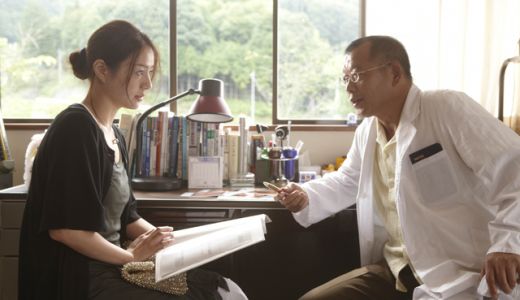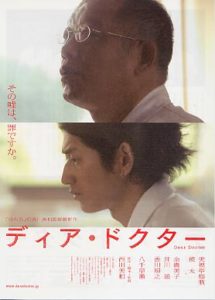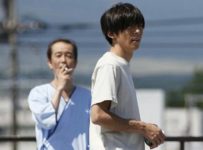Dear Doctor (ディア・ドクター) was one of the most critically acclaimed Japanese films of 2009, topping both the Yokohama Film Festival and Kinema Jumpo lists, and placing at #2 on the prestigious Japan Times list behind Yoshihiro Nakamura’s Fish Story and joining such prestigious films as Villon’s Wife, Zero Focus and Summer Wars. Garnering multiple awards at the Hochi Film Awards, Nikkan Sports Film Awards and the Japan Academy Prize for its writer/director Miwa Nishikawa and various members of the cast. So what is it about this seemingly simple tale of a country doctor that has got critics in a spin? Well, the answer is that it is not as simple as it seems.
A young medical intern Keisuke Soma (actor/model Eita, brother of Solanin actor Kento Nagayama) is sent to a small town in the country. Although he initially believes that he should be in a big-city hospital, he soon learns to love the community and its people. The town’s own Dr. Ino (Tsurube Shofukutei, About Her Brother) is worshiped by the village people, thanks to a seemingly 24 hour service and the ability to cure any ailment that comes his way. However, as Soma’s learning process continues, things about Dr. Ino are slowly unveiled, and raises doubts over whether he is who he says he is.
What at first appears to another retread of Northern Exposure soon turns out to be so much more, thanks to a cleverly crafted script and a unique method of storytelling. From the opening scenes of the film we learn that Dr. Ino is in fact missing, and the remainder of the film cuts between the investigation into his whereabouts and some of the stories that may lead us towards understanding why the doctor would flee this idyllic setting. This device allows us just enough information to begin forming an opinion on Ino, before being presented with new information that forces us to rethink our own moral position. Indeed, nothing about this film is as straightforward as it seems.
Dear Doctor poses the question of whether a single misdeed can destroy a lifetime of good ones and the love and respect of those around you. However, it doesn’t attempt to answer this question in any simple terms or with any grand speeches: the threads left unfinished as a result of Dr. Ino’s departure are more than indicative of the consequences that the town may face without him. In this way, it raises the far more philosophical question of the benefits of purely clinical physicians versus the virtues of more holistic caregivers. Again, this is not a debate that the film hopes to settle, but the simple way that it raises the question in the viewers’ minds elevates this tale to more than just a simple question of right and wrong.
Tsurube Shofukutei delivers an outstanding performance as Ino, using his status as a rakugoka (comic storyteller) and television personality to draw the audience in to his web of trust. This trust is vital for the audience, as it gives us an understanding as to how Ino may have gained the position that he risked so much to hold onto. The cinema audience is, after all, like a small town village: isolated from the outside world, often stuck in a moment in time and only able to relate to the events as they are filtered through to us.
He is supported by a wonderful ensemble cast include the comic timing and fragility of Kimiko Yo (Departures, A Lone Scalpel), who in many ways enables Ino and gives us just enough evidence to feel that perhaps Ino is not alone in his guilt. Teruyuki Kagawa (20th Century Boys), as a pharmacist who bargains with Ino over how many drugs he will buy, and indirectly influences the treatment regimes of the entire village, also gives us a sense of some of the broader consequences of the actions, but similarly speaks to both the motivations for Ino’s actions and the idea that the problems with the pharmaco-medical industry are not just isolated to small-town Japan.
Dear Doctor received almost universal acclaim upon release, although some may feel that it is perhaps a little too slow-moving or quaint for them. Thanks to some gorgeous photography of the Japanese countryside, Nishikawa deliberately lingers on some of the quieter moments of country life and takes her time with the conclusion. However, it would be difficult to understand the head-spaces of just about everyone in the film without this extended exploration. Dear Doctor is a well-paced film that will leave you thinking about it, and perhaps reconsidering some of your own beliefs, for some time after viewing.
Dear Doctor is playing at the 14th Japanese Film Festival nationally. No doubt a movie with a high-profile such as this will be picked up for distribution as well.







No Responses